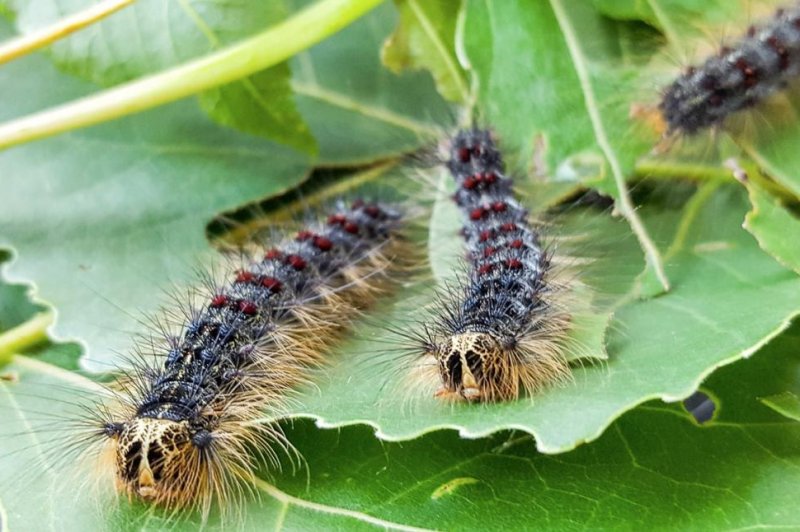Giant Asian gypsy moth threatens trees in Washington

Voracious Asian giant gypsy moths, whose caterpillars can defoliate entire trees, have been discovered in Washington state, the governor announced. Photo courtesy of Washington State Department of Agriculture
DENVER, May 11 (UPI) -- After a warning about the bee-killing Asian giant hornet, Washington state is bracing for invasion of another supersize invasive insect. This one, the Hokkaido gypsy moth, can destroy trees.
Gov. Jay Inslee issued an emergency proclamation last week, warning that the moths have been discovered in parts of Snohomish County, which is northeast of Seattle.
"This imminent danger of infestation seriously endangers the agricultural and horticultural industries of the state of Washington and seriously threatens the economic well-being and quality of life of state residents," Inslee said in a statement.
Hokkaido gypsy moths never have been observed before in the United States. They are exotic pests that can do "widespread damage" when hundreds of voracious caterpillars hatch, Karla Salp, a spokeswoman for the Washington Department of Agriculture, told UPI.
"We see European gypsy moths every year, but these Asian moths are more dangerous because they can fly up to 20 miles and their caterpillars can eat a broader range of host plants," Salp said.
If the pest becomes established in the state, it would threaten forest ecosystems and could lead to quarantine restrictions on commercial lumber and horticulture, state experts fear.
The governor's proclamation allows state pest-control agencies to a spray special pesticide from airplanes on the insects.
Washington state pest agents will be treating moths with a soil bacteria called Bacillus thuringiensis var. kurstaki or Btk. The bacteria is harmless to humans, pets, birds, fish and bees, the agency said.
Female moths, up to 3 1/2 inches long, can lay up to 500 eggs that hatch into brightly colored, hairy caterpillars with maroon and gray dots.
The caterpillars sometimes are mistaken for webworms or tent caterpillars, both native to Washington, Salp said.
In 2017, European gypsy moth caterpillars defoliated one-third of the state of Massachusetts.
In 2018, the state lost about one-quarter of its hardwood trees, including three-quarters of its oak trees, due to gypsy moth infestations, the Massachusetts agriculture department said.
No comments:
Post a Comment